Columbia Launches Hybrid Learning Initiative
Columbia University has
launched an initiative to turn more of its traditional lecture courses
into
hybrid learning experiences that would incorporate the use of
audiovisual
materials, social media, flipped classrooms and real-time feedback from
students.
The
Provost's Faculty
Advisory Committee on Online Learning has asked faculty members to
submit their
proposals to either turn existing courses into hybrid online courses or
create
new courses. A faculty committee will review the proposals and make
recommendations to Provost John Coatsworth, who will announce November 24
which
proposals the university will pursue. A second round of proposals will
be
accepted in the spring.

The
proposals that are
accepted will receive funding of between $5,000 and $20,000 each and
additional
support and resources from the Columbia
Center for New Media Teaching and
Learning.
According
to the formal
request for proposals, "A key goal of this fund is to
measure the effectiveness
of these designs, delivery methods and learning strategies, and to
improve
instructional delivery and learning outcomes."
The
courses, expected to be
taught during the 2015-16 academic year, will not be Columbia's first
experiments
with hybrid learning.
Two
years ago, Associate
Professor Brent Stockwell turned his 180-student biochemistry class into
a
flipped classroom with video presentations and lectures by him that
students
could watch the night before with class time devoted to work on case
studies
and exercises.
"Sitting in one of these 180-student
classrooms is a very passive situation," said Maurice Matiz, executive
director
of the Center
for New Media
Teaching and Learning. "We've found that students aren't really
learning very much."
And
in her 250-student
Body, Health and Disease class, Professor Rachel Gordon used short video
lectures students could view before class, reserving class time for
discussions
of case studies with an audience response system.
"On many levels it was more satisfying than
lecturing, where you don't really know if the students are 'getting
it,'" Gordon
said.
About the Author
Michael Hart is a Los Angeles-based freelance writer and the former executive editor of THE Journal.